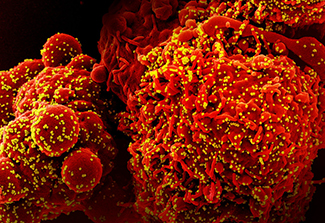The
Division of International Epidemiology and Population Studies (DIEPS) conducts original research in epidemiology and mathematical modeling of diseases, genomic evolution of pathogens, implementation sciences and population studies while seeking to enhance the scientific underpinnings of policies related to international health. DIEPS works to build research capacity in low- and middle-income countries through training and collaborative research in mathematical modeling, genomic epidemiology, biorisk management, implementation sciences and studies in childhood health and development.
Cécile Viboud, PhD, Acting Director

Research Roundup
Read summaries of recently published studies from Fogarty's Division of International Epidemiology & Population Studies (DIEPS).
Publications & News
-
Repeated introductions and widespread transmission of human metapneumovirus in Côte d’Ivoire, co-authored by Fogarty’s Nidia Trovão
BMC Infectious Diseases, September 2, 2025 -
Molecular evolutionary insights into the repeated introductions and cryptic transmission of dengue virus in Saudi Arabia, co-authored by Fogarty’s Nidia Trovão
Journal of Infection, September 2025 -
Differential impact of COVID-19 non-pharmaceutical interventions on the epidemiological dynamics of respiratory syncytial virus subtypes A and B, co-authored by Fogarty’s Samantha Bents, Nídia Trovão, and Cécile Viboud
Scientific Reports, June 24, 2024 -
Impacts of human mobility on the citywide transmission dynamics of 18 respiratory viruses in pre- and post-COVID-19 pandemic years, co-authored by Fogarty’s Amanda C. Perofsky, Chelsea L. Hansen, and Cécile Viboud
Nature Communications, May 16, 2024 -
Charting the evolutionary course of influenza: Insights into epidemic dynamics
Global Health Matters, March/April 2024
-
The risk of mpox importation and subsequent outbreak potential in Chinese mainland: a retrospective statistical modelling study, co-authored by Fogarty’s Kaiyuan Sun
Infectious Diseases of Poverty, February 29, 2024 -
Synchrony of Bird Migration with Global Dispersal of Avian Influenza Reveals Exposed Bird Orders, co-authored by Fogarty’s Nidia Trovão
Nature Communications, February 6, 2024 -
Comparative evolution of influenza A virus H1 and H3 head and stalk domains across host species, co-authored by Fogarty’s Nidia Trovão and Joshua Cherry
mBio, January 16, 2024 -
Effects of Cooking with Liquefied Petroleum Gas or Biomass on Stunting in Infants, authored by HAPIN Trial investigators, supported by Fogarty and other NIH Institutes and Centers
New
England Journal of Medicine, January 4, 2024 -
Liquefied Petroleum Gas or Biomass Cooking and Severe Infant Pneumonia, authored by HAPIN Trial investigators, supported by Fogarty and other NIH Institutes and Centers
New England Journal of Medicine, January 4, 2024
Evaluations
More Information
Updated January 12, 2026